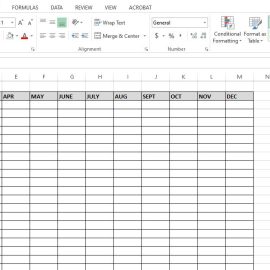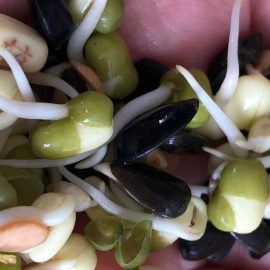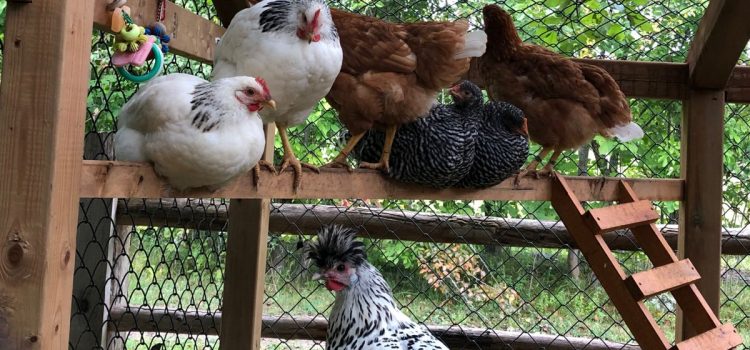
You have made a decision … well kinda, and now you are thinking about starting with chickens. But where do you start? What do you need?
There are a number of aspects to consider. Many refer to chickens as the “gateway animal” that changes your property into a homestead property. I can honestly say that happened here. We already had horses and dogs and then came chickens … however, they did open up a whole new world for me to other animals/livestock.
I have listed some steps that aided us, in prep work here. Thankfully after implementing and in use for a few years I can say working successfully for us too.
Step 1: What Can You Have?
Before you even do any more research, make sure where you are living you are able to keep chickens on your property. Some locations there is a maximum number of chickens you are able to keep. Some areas you are not allowed to keep roosters. Make sure to check your local by-laws, as it is a shame to go to the work of setting up for chickens on your property, to find out you cannot have them. I have heard of many who have had to get rid of their chickens as they didn’t check first.
Step 2: Why and What Type
Why do you want chickens? Are you looking for laying chickens for their eggs? Are you looking for meat chickens? Are you looking for a dual-purpose chickens? How many are you looking for?
Chickens have a job, and that job they take seriously. Chickens are designed to forage. What does that mean? They will scratch and hunt for food. Keeping them in an environment where they cannot do this, will not, keep them as “happy chickens”. If you don’t have happy chickens, then their benefits, to your homestead won’t happen.
Do you have a spot to keep them? Where do you start?
I know lots of questions. But let’s break some of those down.
Step 3: The Coop
Where are you going to keep them? Build a coop? Buy one? If you are like us you have to prepare for keeping them sheltered during the winter months, keeping them away from prey animals, keeping them off your neighbouring properties, do they have an area they can forage?
> Option One: Remodel Something
Do you have the climate where an existing building on your property could be remodeled? Maybe an outbuilding, a garden shed, an old part of the barn?
> Option Two: Building a Chicken Coop
This was the route we took. We are fortunate, as my husband is a carpenter, so he can design and build something with ease. For me … I just gave some ideas through pictures that I liked. There are lots of chicken coop plans available if you are handy with tools.
> Option Three: Buy a Pre-Made Coop
There are numerous companies that sell pre-made coops. If you go this route just make sure it is not super flimsy (as some definitely are) and make sure they will withstand your climate requirements. Many homes look at what is referred to as a “chicken tractor” where you can move the chickens within this structure around your property to forage and work the ground. This works great for its purpose, however, these are not a long-term solution from extreme elements within many climates.
Options within the Coop Itself
A chicken coop can be as simple or complicated as you want. There definitely are some areas to consider though before starting it:
Where will it go on your Property?
Some questions to ask yourself. Does it face south? Is it blocked from the wind? Shade? Distance from your home? Is your sight-line easy to see what is going on there? Distance from the barn if that is where you store feed etc? Water access?
How Big will it Be?
- Remember you need the space to build the coop, and the area for them to forage.
- The inside of the coop itself – you don’t want to build it too small as it is hard to change after the fact.
- – A good rule of thumb for a regular-sized chickens is five square feet of coop space per chicken, plus their outdoor access.
Ventilation
What type of winters do you have? Our winters can be very cold. So in cases like ours they should be insulated and draft free. On those -30 degree C winter days you will be thankful it is draft free and insulated in order to help with the frostbite factors (yes chickens combs get frostbite).
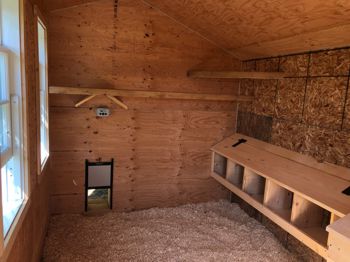
All coops need ventilation! Do not miss this step. This is critical for all seasons. Without ventilation you risk frostbite in the winter to their combs and breathing issues in the heat of the summer. Poor ventilation = sick chickens. Ammonia from their feces and the dust from the coop, along with dander from feathers creates dust and lots of it. If the coop has poor ventilation you have a stuffy environment which will become damp as their droppings are wet. Humidity builds up and you have a problem.
Nest Boxes
Nest boxes how many are you looking to have? This depends on your flock numbers. You do not need a nest box for every chicken. Many people make this mistake. The chickens will share boxes. For example, I have 6 nest boxes and I like to keep my flock around 15.
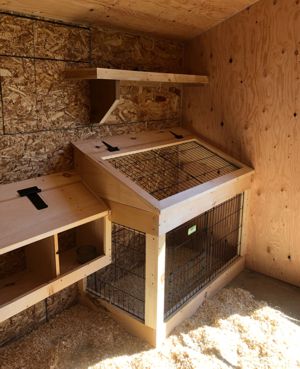
Brooder Box
Do you have an area for a brooder box? This is an area where you introduce new chickens to the flock. Chickens can be extremely difficult and brutal when it comes to introducing new members into the flock so it is a good idea to have a location in the coop where new chickens can be introduced and stay within for at least, 2 weeks to a month, so the rest of the flock gets used to seeing them and makes the introduction easier.
Water
Water this is a personal preference of how you want to add to your coop. It needs to be changed often and review what options you have. You don’t want the water to be continually knocked over as that creates its own set of problems too. I have found with my flock that I like the nipple water system. They are easily trained to use it and it creates a much neater and healthier environment for the water itself.
Feed
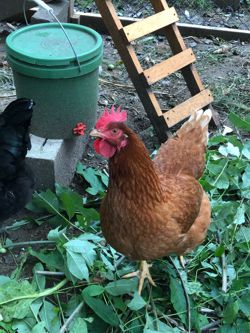
Feed within a coop – you want to have a system that doesn’t feed all the rodents who are around. The first few months of my coop I found the chipmunks were taking away the feed (like no tomorrow) so we definitely made a system to eliminate them getting into the feed bucket itself. We now have a hanging bucket with a toggle on it which the chickens hit and the food drops. Much less waste.
Cleaning
Think of cleaning the coop. Can you easily stand to clean it? Believe me the coop needs to be cleaned, and you don’t want to be crawling around to do it.
Now What?
If you have answered all these questions and you are still interested in chickens. Then go for it! You won’t regret it. Once you have those tasty eggs, you will never look back! Plus their personalities are so much fun.

